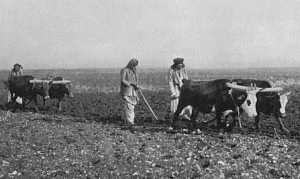Revised: 25-Nov-2014
How to cite this article: David N. Bivin, “Jesus’ Yoke and Burden,” Jerusalem Perspective (2004): [https://www.jerusalemperspective.com/4435/].
Come to me, all you who are weary and burdened, and I will give you rest. Take my yoke upon you and learn from me, for I am gentle and humble in heart, and you will find rest for your souls. For my yoke is easy and my burden is light. (Matt. 11:28-30; NIV)
Although extraordinarily beautiful, Jesus’ saying recorded in Matthew 11:28-30 is enigmatic. What is this saying’s meaning, and what were Jesus’ “yoke” and “burden”?[1]
A Context-less Saying
The “Comfort for the Heavy-Laden” passage (Matt 11:28-30) is unique to Matthew’s gospel—we find no parallels to it in the other three gospels. Furthermore, the setting for the Matthew 11:28-30 passage is difficult to establish. The passage appears following the “Woes on the Cities of Galilee” (Matt. 11:20-24) and “Jesus’ Thanksgiving to the Father” (Matt. 11:25-27) pericopae, neither pericope seemingly providing a context for Jesus’ “Comfort for the Heavy-Laden” teaching. Luke’s gospel, too, preserves the “Woes on the Cities of Galilee” (Luke 10:13-5) and “Jesus’ Thanksgiving to the Father” (Luke 10:21-22), but places the two passages in the context of the “Sending Out and Return of the Seventy.”
Premium Members and Friends of JP must be signed in to view this content.
If you are not a Premium Member or Friend, please consider registering. Prices start at $5/month if paid annually, with other options for monthly and quarterly and more: Sign Up For Premium
Notes
- One should consult the standard commentaries on this passage. In addition, see S. Bacchiocchi, “Matthew 11.28-30: Jesus’ Rest and the Sabbath,” AUSS 22 (1984): 289-316; Hans Dieter Betz, “The Logion of the Easy Yoke and of Rest,” JBL 86 (1967): 10-24; J. J. C. Cox, “‘Bearers of Heavy Burdens,’ A Significant Textual Variant,” AUSS 9 (1971): 1-15; M. Maher, “‘Take my yoke upon you’ (Matt xi.29),” NTS 22 (1975): 97-102; G. N. Stanton, “Matthew 11.28-30: Comfortable Words?” ExpTim 94 (1982): 3-9.[↩]




Comments 5
This is an interesting religious interpretation of Y’shuah’s “yoke”/”discipleship” message. It appears to be based on the post-Javneh rabbinical philosophy of Torah study sufficing for sacrifices (which no longer could be made due to a non-existent capitol building complex). I can’t agree w/this context. Nor can I agree w/the pragmatics involved.
I believe the context is oppressive 2nd Temple government administration as-applied by the corrupt political officals who foisted it upon the citizens. I believe this text is a reference to Y’shuah’s method of preparing political leaders compared to the customs of the 2nd Temple period. I also believe it is a reference to the results that each method/school achieved: Oppressors who hunt-down law-violators and who collect revenues vs. Righteous and just men who carefully manage communities for their welbeing and maturity.
I believe that Y’shuah’s purpose for requiring his followers to forsake all their possessions, family, lifestyle, etc. was to prevent the government from having an avenue of leverage against them when the oppression came down upon them. At that point, it would be a simple matter of will-against-will: government will against disciple’s will. Y’shuah exemplified this in his journey to the cross. Conversely, whatever the disciple loved besides obeying Y’shuah, that was his Achille’s heel, b/c that is what the governemnt operatives would leverage to cause them to compromise their obedience to Y’shuah/Torah.
To me, the “yoke” concerns how Y’shuah interprets Torah and applies it to his disciple’s life, in contrast to how 2nd Temple government ‘made law’ and ‘enforced’ it against the unsuspecting. When has any human government not oppressed its people t/o human history?
The “yoke”, IMO, is the caring, righteous way that Y’shuah trains his leaders, and the results accrued: Righteous, just, compassionate leaders who won’t “use and abuse” those under their care (who won’t take bribes nor allow law-breaking to corrupt them or their congregation). THAT is what God’s kingodm is all about.
God’s in the business of making His people holy (= “Torah observant” and charitable), not obedient functionaries who choose to not “say no” to morally corrupt orders for fear of losing their paycheck. Nor is God in the business of training or hiring those who delight in oppresing people “b/c they can” (which is all too common today).
God populates His kingdom with mature adults who can discern between right and wrong, regardless of whether or not it has the face of human government. The “conquest” books show that God hated commerce when it was called “Canaanite”, and he hates it just as much today when under its new name “business”.
That’s what I believe this “yoke” scenario/saying is about.
I wonder if anybody out there agrees with me, or has enough experience to offer further comments on my thoughts?
Footnote 32 refers to a forthcoming article by David Bivin entitled, “Acts 15:20: How Many Commandments Were Jesus’ Followers of Non-Jewish Parentage Commanded to Keep?” Is this still a work in progress?
Author
Thanks for the question, David. The article you ask about is still a work in progress.
could it be that Jesus was talking about love instead of torah or the burden of discipleship when he was talking about his yoke and burden, and taking up the cross. seems that this would fit nicely with his teaching of giving a new command and the fact that he said that love was the fulfillment of the law/torah.
Please post all new comments about this article below. An archive of previous discussion of this article can be viewed in the forum.